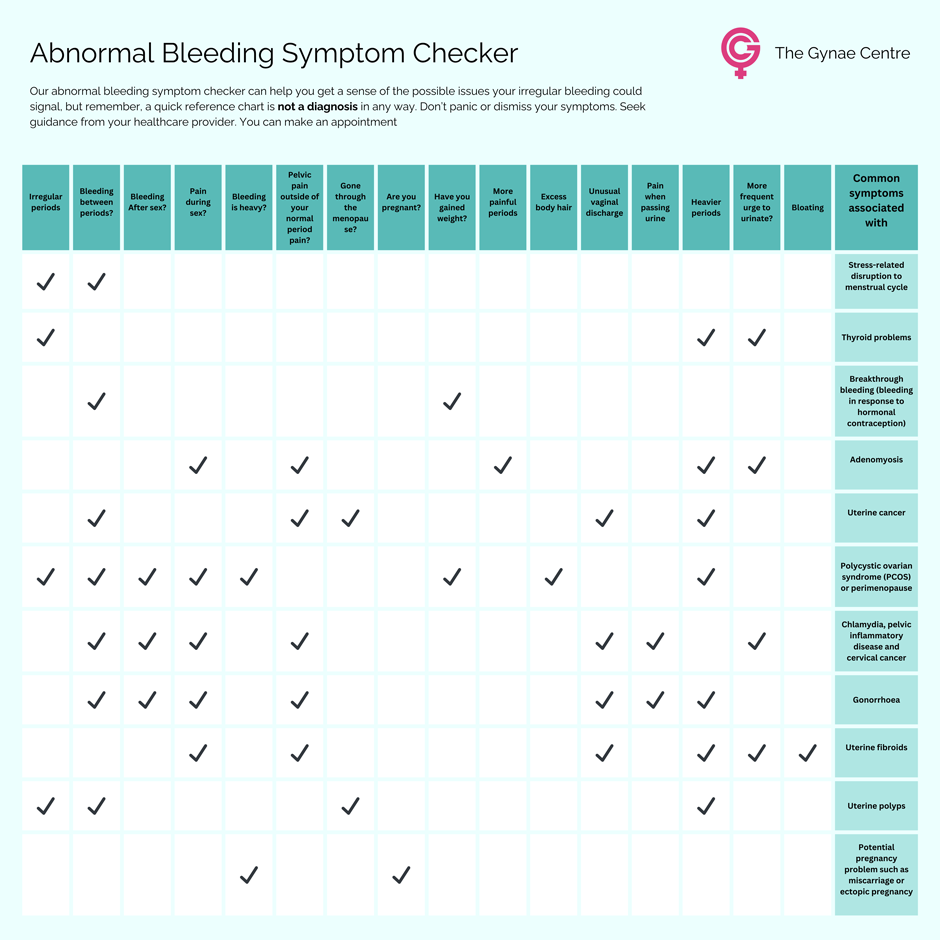Are you experiencing vaginal bleeding that is unusual for you? Many women will experience some irregular bleeding (or ‘spotting’) at some point in their lives and it’s often nothing to worry about. But it should never be ignored because it could signal a problem. Here at The Gynae Centre, lots of women come to see us with irregular bleeding and with the right skills and sophisticated diagnostic equipment, we are able to get to the root of any issue swiftly. So what does abnormal bleeding mean?
Dr Albert Aka, Consultant Gynaecologist at The Gynae Centre says: “There are many difficult things abnormal bleeding could signal, from stress, to hormonal changes or unfortunately in some cases, something malignant. It may well be nothing to worry about, but the only way to be sure is to get checked out.”
What abnormal bleeding means tends to depend on the other symptoms that accompany it. Here we’ve included a symptom chart checklist to give an idea of some of the issues that certain collections of symptoms may indicate. This is to help encourage women to get checked out. You may have some or all of the symptoms for a given condition, but only a doctor can interpret your symptoms and examine you to provide a diagnosis. So take a look at the chart below and then make an appointment with a doctor – never self-diagnose.
What does abnormal bleeding mean? Glossary of terms in the chart
We realise some of the terms in the What Does Abnormal Bleeding mean chart may be unfamiliar to you, so here are some quick definitions:
- Adenomyosis – This is quite a common disorder (around 10% of women have it) in which cells from the womb lining penetrate the uterine wall. It can cause problems such as very painful heavy periods and discomfort during sexual intercourse.
- Polycystic ovarian syndrome (PCOS) – An imbalance of hormones, PCOS disrupts a woman’s ovulation and often causes many other symptoms such as excess hair, weight gain and abnormal bleeding. Because it interferes with ovulation, many women with PCOS experience fertility problems too.
- Pelvic inflammatory disease (PID) – Most often pelvic inflammatory disease begins as a bacterial infection that has climbed from the vagina or cervix up into the pelvic organs. This could be an STI such as gonorrhoea or chlamydia, or it could simply stem from bacteria that usually dwells in the vagina. Uncomplicated PID can be treated with a simple course of antibiotics, but if left untreated it can lead to complications that create fertility problems, so it is important to get checked out swiftly if you suspect PID.
- Thyroid problems – The thyroid is a gland that governs a number of important hormones. When the thyroid is underactive (hypothyroidism) you may experience irregular bleeding, often along with other symptoms such as fatigue and weight gain.
- Uterine fibroids and uterine polyps – These are benign (non-cancerous) growths that tend to appear in the womb lining, and can create pelvic pain, irregular bleeding and other problems.
Abnormal bleeding – when to see a doctor
Too often, we may ignore symptoms because we assume they are ‘no big deal’. Our abnormal bleeding symptom checker can help you get a sense of the possible issues your irregular bleeding could signal, but remember, a quick reference chart is not a diagnosis in any way. Don’t panic or dismiss your symptoms. Irregular bleeding may be nothing serious, but it could signal something more worrying and only a doctor can determine that. You will usually be examined and you may need scans too. So make an appointment if you notice any irregular bleeding.
The Gynae Centre is the UK’s leading gynaecology clinic, providing expert care without a wait. We are based in central London and offer telephone and video consultation from anywhere in the UK. Call us on 020 7580 8090 or book online.







